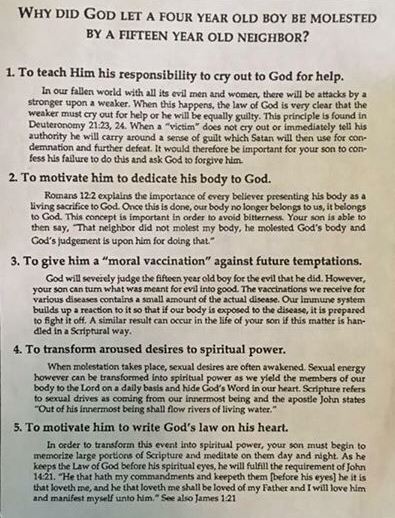This
post is part of a series examining the “strange woman” doctrine.
The
concept of a “strange woman” is an unofficial
doctrine**
held by some Independent Fundamental Baptists concerning sexually
abused girls: They become human garbage and things to be used, to be
dispensed with in whatever way is convenient to those who have charge
over them. Note that many doctrines in a high demand group are not
formally documented but become part of the oral tradition or the
hidden
curriculum**
of their culture and are often more powerful rules than the formally
stated ones.
Ron
Williams of Hephzibah House offers a very lengthy sermon about this
insidiously taught doctrine causing pastors confront occurrences of
sexual abuse in their congregations and in educational settings.
(Full sermon transcript available HERE.
Audio available HERE.)
The
Mystical Magical Power of Crying Out to the Cosmic Bellhop
Bill
Gothard has all sorts of doctrines that claim that “crying out”
will fix anything. If you have the right heart and soul, you will be
untouched by evil. If you end up that way, shame on you.
He even has a book by this title. But here is Ron Williams using the same language and applying the same principle.
He even has a book by this title. But here is Ron Williams using the same language and applying the same principle.
™
QUOTE:
Part II, Dinah's
Preventable Defilement
But
Dinah, for her part, had responsibility too, she was culpable she had
her responsibility.
™
QUOTE:
Part II, Dinah's Damning
Silence
You
know, another thing that bothers me about this story with Dinah is
that the text doesn’t tell us that she cried out. I hope girls,
that if any jerk ever puts his hands on you, you will scream your
tonsils out. . .
But
Dinah, now maybe she did, but the text is silent and I understand
this is an argument from silence, but we don’t see Dinah here
screaming. We don’t see her crying out. That bothers me.
[Example
of a the behavior of a hunted ermine]
That
they’d be willing to scratch some jerks eye balls out rather than
lose her purity, because here’s an animal in nature who’s willing
to die rather than lose its purity.
Source (IBLP Worksheet Supplement)




